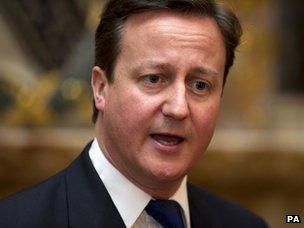Is the welfare state about need or nudging?
- Published
- comments

To William Beveridge it was about eradicating evil - the "giant evils" of squalor, ignorance, want, idleness and disease. To David Cameron it is about encouraging citizens to do the right thing - to work, to save, to take personal responsibility.
The prime minister urges us today to go back to first principles in thinking about what the welfare state is for.
For some it should be the mechanism by which the state seeks greater social justice. For others it should be a mechanism by which the state seeks to promote individual morals.
Mr Cameron's starting point for a national debate appears to echo the view of the high Tory thinker and journalist TE Utley, external, who described the welfare state as "an arrangement under which we all largely cease to be responsible for our own behaviour and in return become responsible for everyone else's."
Instead, the Conservative leader imagines a welfare system where ministers in Whitehall pull fiscal strings which encourage people towards his party's core values of hard work, saving, marriage and having children (when you can afford to).
To Mr Cameron, the machinery of state benefits is less about need and more about nudging. He wants to end the "culture of entitlement" and focus on those "who have no other means of support, or who have fallen on hard times".
IDS: We are engaged in possibly the most radical and wide-ranging welfare reform in a generation
In order to strengthen his argument, the Conservative leader paints a picture of "them" and "us". He talks of a "welfare gap in this country - between those living long-term in the welfare system and those outside it."
It is a view that plays directly to ancient anxieties about the residuum of society, external, the shadowy people who remain in poverty because of their indolence, incorrigibility and moral corruption. Mr Cameron notes the division and resentment "amongst those who pay into the system" against those who are "getting without having to put in the effort."
This battle between "strivers versus skivers" has underpinned British attitudes to poverty since the Poor Laws, external. Ministerial rhetoric about scroungers, benefit cheats and what Kenneth Clark recently called "the feral underclass" presses the point.
There are two problems with this argument. First, those in poverty are not part of some clearly defined group. Many people move in and out of welfare all the time as their circumstances change. Secondly, because it is not that simple, there is a significant risk that measures designed to kick the feckless up the backside end up hurting the poorest and most vulnerable.
The Conservatives want to make the welfare state simpler - the Universal Credit, external introduced next year is a bold attempt to do that. They also want it to cost less - the chancellor has already made it clear he wants to save a further £10bn from the welfare budget in the first two years of the next Parliament.
But the welfare state is complex because it is trying to do a very complex thing - provide tailored support of exactly the right amount and type only to those individuals who need it. "Strivers versus skivers" may appeal as a slogan, but the world isn't that simple.